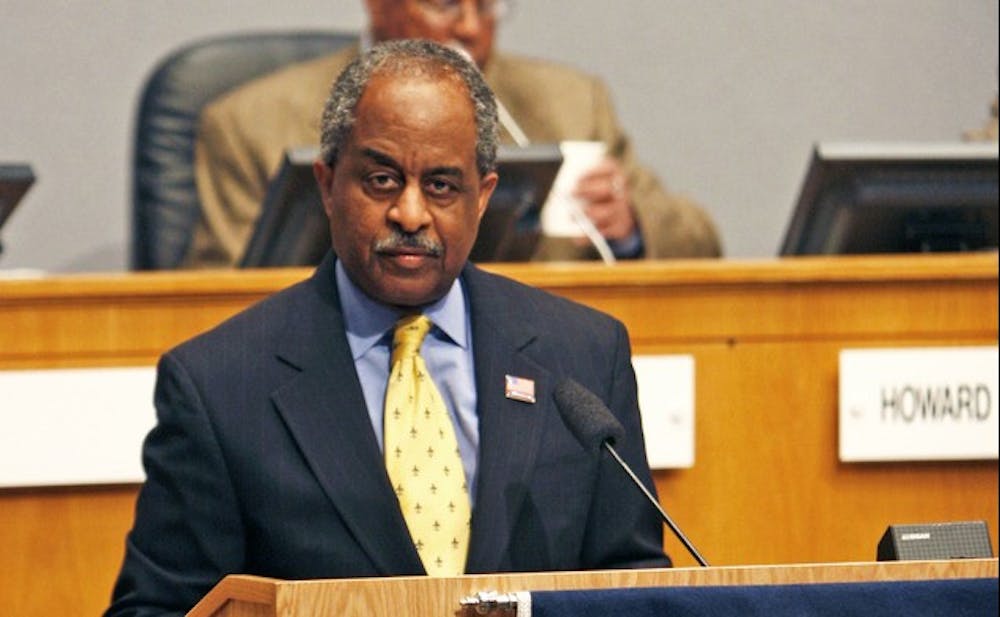Durham Mayor Bill Bell highlighted Durham’s economic progress and laid out goals for the city in the coming year during his annual State of the City speech to the Durham City Council last Monday. He spoke about the opening of four new hotels, increased public-private partnerships in downtown development and efforts to promote mixed-income housing units as indicators of the year’s economic success. He also laid out tasks the city will address during the coming year, including crime prevention and efforts to preserve affordable housing options. The presentation featured a video of city employees highlighting Durham’s 2015 accomplishments to the tune of the Montell Jordan hit, “This is How We Do It.” The Chronicle’s Sarah Kerman spoke with Bell about his plans following his address.
The Chronicle: What challenges do you foresee in responding to resident feedback this year?
Bill Bell: Questions about time—how soon can you make changes? For example, one area that seems to be of concern was the issue of transportation. Transportation can cover a broad area—it can be public transportation, it can be roads and it can be an issue of congestion. Some of the issues are long-term issues but in terms of hopefully getting the goal accomplished you’ve got to have a plan in place to make those things happen.
TC: Two years ago in your State of the City address you laid out the challenge to begin the city’s poverty reduction campaign. How do you envision the city’s path forward on that campaign in the coming year?
BB: In 2014 when I announced the program the next thing we did is we had a meeting where we invited the community to come in. We decided to target certain sections of the city as our initial focus. We did that using census data. We wanted to find which census tracks had the highest level of poverty and we wanted to start there. It’s taken until 2015 to really get us to the point where in 2016 we now have some clear objectives. What we are hoping is that if we are successful in that area with that approach then it’s sort of a template to move to other areas in the city.
TC: Is poverty reduction too ambitious a goal for city government?
BB: We like ambitious projects. If things were easy, they would have been done. The issue of poverty is a real concern not just for people who are in poverty, but this should be a concern for our city as a whole. We try to do this in a data-driven manner rather than anecdotal. Again while it was initiated in my State of the City address as mayor, it really is a more comprehensive effort because we have county commissioners involved, we have the school board involved. When asked if it is too much of a challenge just for the city I would say yes if the city was doing it by itself but the city is not doing it by itself. We’ve broadened the involvement, so it’s not just a city effort—it’s a county-wide effort.
TC: What role have you had, if any, in the selection of the new police chief and how is that process going to your understanding?
BB: My role has been primarily in the conversations I’ve had with the city manager. Additionally the city manager hired an outside consultant, a search firm to do this. That search firm has spoken to a lot of people throughout the community and has talked to me also in terms of what input and observations I had. I think the process is going well. We’ll be doing interviews and background checks before this comes to the city council. He’s on schedule in terms of hopefully having someone selected by April and hopefully having that person assume the position in May.
TC: Durham is now North Carolina’s fourth largest city—how do you envision its growth differentiating from the development of other growing cities in the state?
BB: It’s become a more attractive city for people who want to work especially in the entrepreneurial high tech areas. I think the combination of opportunities, where we’re situated in the state in the Research Triangle area, all of these things have come together to make it much more attractive. Durham itself is a very walkable community. You can probably get to any spot in [downtown] Durham walking in about 15 to 20 minutes. What we’re finding is that students who previously may have graduated from the universities and moved elsewhere are now choosing to look at opportunities in Durham. In the past we hadn’t seen that much happen. We are probably the only city that has no ethnic majority... and I think that diversity has come about because persons see Durham as other opportunities.

